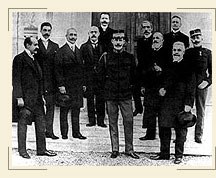|
The second Athens Olympiad
During the official dinner which was given in the palace after the closure of the first modern Olympic Games, King George I addressed the wish that Greece be a "permanent field for the Olympic Games".  Such a thing was not specified in the decisions of 1894, according to which the organization of the Games was to be undertaken by turns by a different country every four years. But the proposal for the permanent carrying out of the Games in Greece echoed the attitudes of the Greek public opinion and constituted the subject of public discussions through newspapers columns. This climate led the prime minister Theodoros Diligiannis to introduce a government bill on gymnastics, which specified, inter alia, that the Olympic Games would be held every four years in Greece. Such a thing was not specified in the decisions of 1894, according to which the organization of the Games was to be undertaken by turns by a different country every four years. But the proposal for the permanent carrying out of the Games in Greece echoed the attitudes of the Greek public opinion and constituted the subject of public discussions through newspapers columns. This climate led the prime minister Theodoros Diligiannis to introduce a government bill on gymnastics, which specified, inter alia, that the Olympic Games would be held every four years in Greece.
These developments caused the reaction of the International Olympic Committee and of its new president, Pierre de Coubertin. Dimitrios Vikelas attempted to defuse the tense situation through a conciliatory proposal, according to which the international Olympic Games would continue to be held every four years in a different country and city, whereas in the intervening time between two Olympic organizations "intercalated" Games would be held in Greece, always. Indeed, the discussion of Vikelas' proposal was included in the issues of the sports congress that would be held in 1897 in Le Havre (France). Nevertheless, the Greek-Turkish War of 1897 deterred the Greeks from participating in the congress. As provided by law ÂÊ×Á', which was promulgated almost two years later, in 1899, Greece would organize the Olympic Games every four years. However, nothing was done for the materialization of this idea.
The issue of the Olympic Games being held in Greece reappeared in 1905. It was then that the COG applied pressure on the government to organize Olympic Games in 1906, which would be the first of the series of "interim" Games. This time the circumstances were more favourable. The reaction of the IOC was again strong, but less binding for the COG compared to the recent past, due to the failure of the Olympic Games held in Paris (1900) and Saint Louis (1904). What is more, the intention of Greece to organize its own Games in the meantime between the third (1904) and fourth (1908) Olympics, celebrating at the same time the 10-year anniversary of the first modern Olympic Games, was favourably greeted by the sports officials of several countries. Therefore, the so-called second Athens Olympiad became reality in April 1906.
The Games were carried out in the same sites as the first Olympic organization, and it was Charles Perry again who saw to the suitability of the track of the Panathenaic Stadium. A programme of the Games was printed in several languages and a special series of stamps was issued for covering the expenses. The responsibility for the organization was entrusted to the COG. The accommodation of the athletes was taken care of to a degree with the use of the Zappeion hall as a lodging, whereas the thousands of Greek and foreign visitors of Athens stayed in the few hotels of the city and in houses that had been rented for that purpose. For the formation of the Greek Olympic team test events had been carried out in Athens (Panhellenic Games), in Smyrna (Panionian Games), in Constantinople and in Alexandria, under the supervision of Spyridon Lampros and other members of the COG.
The competition programme of the Interim Games included 11 sports with 75 contests approximately. More than 900 athletes participated in them, who came from 20 countries, a fact that made the Interim Games the largest sports meeting of nations until that time. The athletes from the USA dominated the track and field events, with Archie Hahn, Ray Ewry, Meyer Prinstein and Martin Sheridan being the leading figures. It should be noted that it was the first time that test events were carried out for the formation of the Olympic US team in view of the Interim Games. The most eminent athletes of the Greek team were Dimitris Tofalos, who came first in weightlifting, Nikos Georgantas, who was third Olympic winner in 1904 and in the Interim Games he won one gold and one silver medal in the throws and Michalis Dorizas, who was third in the throws and two years later, in the Olympic Games of 1908, he won the silver medal in the javelin throw.
At the closing ceremony of the Interim Games, which was combined with the awarding of medals, prizes and honorific diplomas to the winners, the intention of Greece to organize these Games again in 1910 was stressed, but that did not happen. So, despite the success of the organization, which was the most important sports meeting that had been realized up to that moment, the institution did not survive. What is more, the IOC did not recognize those Games and did not include the winners among the Olympic winners.
|